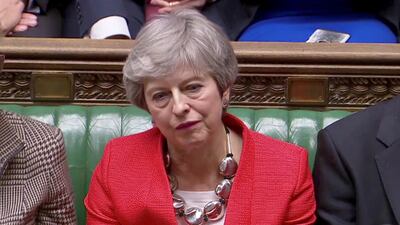Britain will slash tariffs if MPs vote on Wednesday to leave the world’s largest trading bloc without a deal, the government announced.
The tariff proposals were published amid political chaos after a heavy defeat for prime minister Theresa May on Tuesday that has left officials and MPs scrabbling over what happens next.
Britain’s newspapers were damning over the failures to secure a deal with the front page headline of middle-market tabloid the Daily Mail declaring “The House of Fools” that had chosen to “plunge our despairing nation into chaos”.
Europe's chief negotiator Michel Barnier said on Wednesday it wa sup to the UK to come up with a new plan that could stave off the threat of a no-deal Brexit.
"We are at a critical point. the risk of a no deal has never been higher," he told the European parliament in Strasbourg.
In the event of a no-deal that severs the UK's links with the EU at a stroke on March 29, the government detailed plans that would see 87 per cent of all imports to the UK subject to tariffs, up from 80 per cent.
Mrs May was chairing a cabinet meeting on Wednesday at the start of another crucial day which could see the UK still leave the EU without a deal or result in MPs trying to delay the departure date in the hope of finding a way through the impasse.
Britain’s main employer’s organisation warned the temporary tariff move would take a “sledgehammer” to the economy and complained that businesses had not been consulted over the changes. Organised crime could also exploit the situation, the government warned.
“What we are hearing is the biggest change in terms of trade this country has faced since the mid-19th century,” Carolyn Fairbairn, the head of the Confederation of British Industry, told the BBC.
“This is no way to run a country.”
The changes would see a shift in the burden of tariffs to the EU and away from the rest of the world. The government said it would not introduce any new checks or controls on goods moving across the border on the island of Ireland.
The government said there would be “challenges and risks” including from organised crime seeking to exploit any new system to smuggle goods into the UK.
“That is why we are clear that this approach will only be strictly temporary,” the government said in a statement.
Trade Policy Minister George Hollingbery said: “This balanced approach will help to support British jobs and avoid potential price spikes that would hit the poorest households the hardest.
“It represents a modest liberalisation of tariffs.”
The announcement came after the defeat on Tuesday cast into doubt Britain’s prospects of leaving the EU with some MPs pushing for a second referendum on the issue. The 2016 vote saw Britons back leaving the EU by 52 per cent to 48.
MPs rejected Mrs May's deal agreed last with EU officials after months of talks by a majority of 149 after minor tweaks to the plan failed to convince Eurosceptic MPs that they would not remain tied to rules imposed by Brussels for years after departure. Mrs May lost a previous parliamentary vote on the deal by 230 in January.
The EU had warned that Tuesday's vote was the last opportunity to secure a negotiated deal on Britain’s departure.
MPs will vote on Wednesday on whether or not the UK should leave on March 29 without a deal.
If MPs block a no-deal exit they are expected to request a delay from the EU on Thursday.
The votes come amid the backdrop of a deeply divided country with polls showing roughly even splits for the competing options of scrapping Brexit entirely, backing Mrs May’s plan, or leaving the EU without any future agreement in place.

